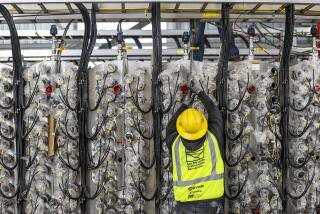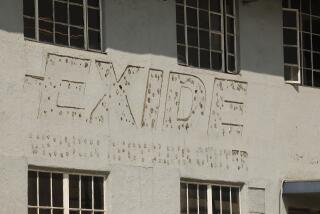Taxpayers to Fund Lockheed Burbank Site Cleanup : Environment: The Pentagon agreed to pay much of the defense contractor’s estimated $94-million bill to cleanse contaminated soil. The company plans to sell the land.
- Share via
Lockheed Corp., which is expected to get about $200 million for its surplus land in Burbank, will also receive a considerable boost from taxpayers, who will pay millions of dollars for a huge soil cleanup and other costs related to the sale.
To prepare the land for prospective buyers, Lockheed will spend an estimated $94 million to cleanse soil contaminated by decades of aircraft manufacture. But according to a report by the U.S. General Accounting Office, the firm expects to recover most of the expense from its main customer, the Department of Defense.
The situation has come under attack by a number of critics, including Rep. John Conyers Jr. (D-Mich.), chairman of the House Government Operations Committee, who denounced it as “corporate profiteering” and “a sweetheart deal.”
“The revelation that Lockheed plans to charge the U.S. taxpayer for cleaning up land that will be sold for $200 million is the latest chapter in an anything-goes story of lax Pentagon procurement safeguards,” Conyers said in a statement to The Times.
“It’s a rip-off,” said Lenny Siegel, chief researcher for the National Toxics Campaign Fund’s military toxics project. Siegel said any government funds connected with Lockheed’s departure should be spent on helping displaced workers, “not on bailing out the company.”
But Lockheed officials defended the arrangement, saying that all companies pass on business expenses, including environmental costs, to their customers. “Our customer happens to be the U.S. government,” said Bob Rulon, Lockheed’s vice president and controller.
Burbank City Manager Robert Ovrom, who is leading city efforts to attract new business to the Lockheed site, also described the toxic waste cleanup as “a cost of doing business. . . . Neither the Pentagon or Lockheed can walk away from the toxic mess they made when they built these fighter jets.”
Lockheed, which has relocated most of its aerospace operations to Palmdale and Marietta, Ga., is planning to sell about 250 acres of its former manufacturing complex--part of which was once owned by the Air Force. A portion of the land is to be sold for the planned expansion of Burbank Airport. Another section has been mentioned as a possible site for a major sports arena, shopping center or motion picture studio.
But portions of the land are heavily stained by chemical solvents and other wastes from leaky tanks and piping and disposal operations. Soil testing and cleanup that began several years ago has recently picked up steam, and will ultimately cost about $94 million, the GAO reported last month.
But this work--which will enhance the value of the property--is only part of the cleanup burden facing Lockheed and the Pentagon.
Under a consent agreement with the U.S. Environmental Protection Agency, Lockheed is to fund most of a Burbank ground-water cleanup under the federal Superfund program. That’s because the Lockheed property is considered a major source of the contamination that has shut down Burbank water supply wells, forcing the city to rely on more costly purchased supplies.
Before signing the agreement with the EPA, Lockheed reached a tentative agreement with the Department of Defense that will allow the firm to charge much of its Superfund costs to current and future contracts.
The GAO said the cleanup of company property and Superfund work will cost Lockheed about $194 million. And since the firm relies on the Pentagon for about 70% of sales--and plans to charge its best customer a proportional share of the costs--taxpayers could get stuck for up to $135 million.
Even these numbers could be on the low end because they omit certain costs--such as demolition of buildings on the Lockheed property. Although the demolition cost is uncertain, “I think it’s reasonable to assume it would be in the tens of millions” of dollars, said Robert Slayman, Lockheed’s director of news and information.
Moreover, while Lockheed’s Superfund role currently involves only Burbank’s ground-water problem, the EPA has said it may also hold the firm responsible for ground water cleanups in North Hollywood and Glendale.
Lockheed has tapped its own environmental subsidiary--Lockheed Environmental Systems and Technologies Co.--to manage the cleanup work, generating criticism that the company will benefit from the pollution it caused.
“I have a problem as a taxpayer in underwriting . . . their cleanup costs,” said Tom Paterson, chairman of the airport and land use committee of the Valley Village Homeowners Assn.
Paterson’s group opposes expansion of Burbank Airport onto Lockheed property--a process he said will be helped along by the government’s role in the cleanup.
“By having the Pentagon . . . underwrite the toxic cleanup costs, that makes it easier for the airport to develop to its maximum growth potential,” Paterson said.
Rep. Howard L. Berman (D-Panorama City) said he could “see the case” for the Pentagon contributing to the Superfund cleanup, “since presumably the conditions were caused by a corporation meeting a Pentagon request.”
But when it comes to a private sale of land cleaned up with public funds, “it could be viewed as a windfall to the defense contractor,” Berman said.
“I have not done a lot of research into this,” he said, but “I think that’s a question worth pursuing.”
Even at $200 million, Lockheed officials said they might only break even on the sale of the land.
Rulon, the company vice president, said certain sales costs cannot be charged to the government. And he said some cleanup costs might be disallowed as government policy evolves in this area.
He said Lockheed may even forgo certain charges to avoid the risk of being underbid by competitors.
For these reasons, Rulon said, the 70% of cleanup expenses that Lockheed may receive “is clearly a topside number.”
Although there are no specific laws or rules on repayment of environmental expenses, contractors have been reimbursed under a provision of the Federal Acquisition Regulation allowing payment of costs that are “reasonable” and “ordinary and necessary to the contractor’s business.”
Conyers and California Rep. Barbara Boxer, who was elected to the Senate last week, asked the GAO to investigate following a report in The Times that the Pentagon was becoming a key underwriter of Superfund cleanups without congressional review.
A GAO report in July found that Pentagon officials were unable to estimate past or future costs of paying contractors’ cleanup expenses.
In a follow-up report last month, the GAO said the taxpayers’ bill may be “many hundreds of millions of dollars” at just four sites polluted by military contractors. The four were Lockheed’s Burbank site, Aerojet-General Corp.’s property near Sacramento, and two disposal sites in Washington state formerly used by Boeing Co.
More to Read
Sign up for Essential California
The most important California stories and recommendations in your inbox every morning.
You may occasionally receive promotional content from the Los Angeles Times.













